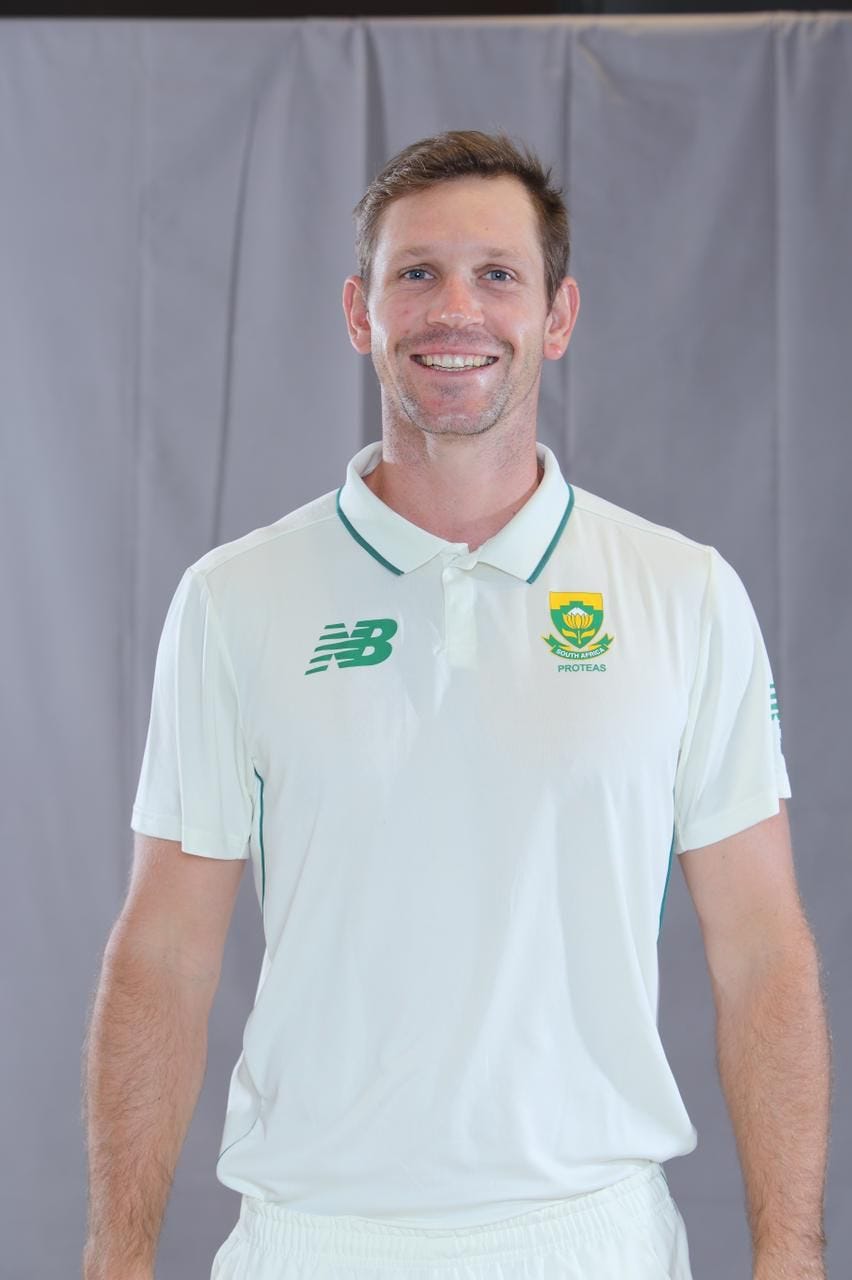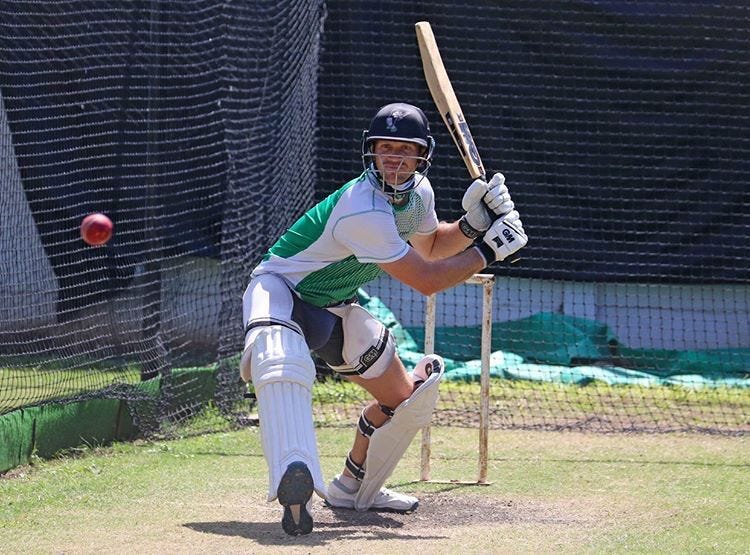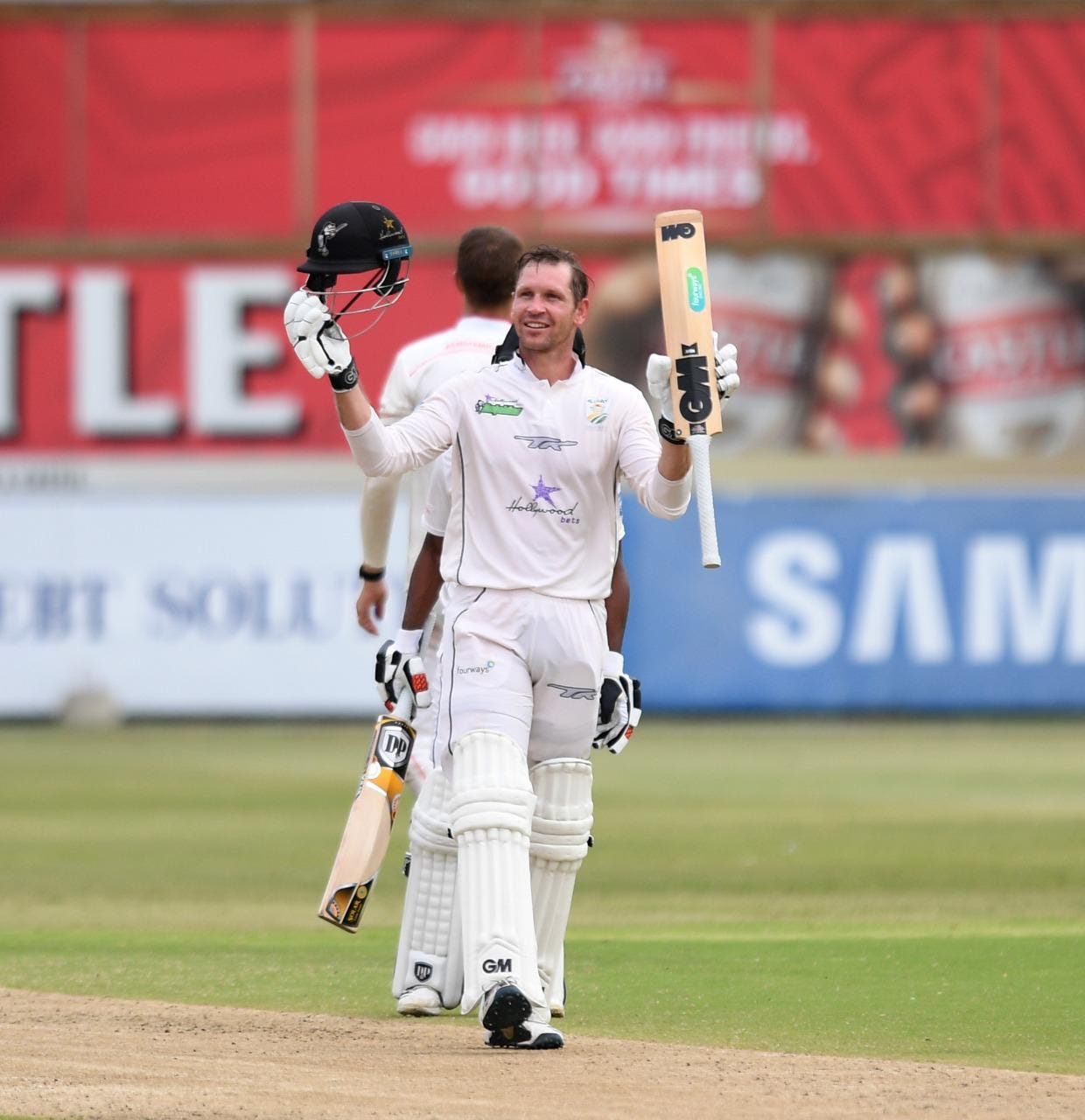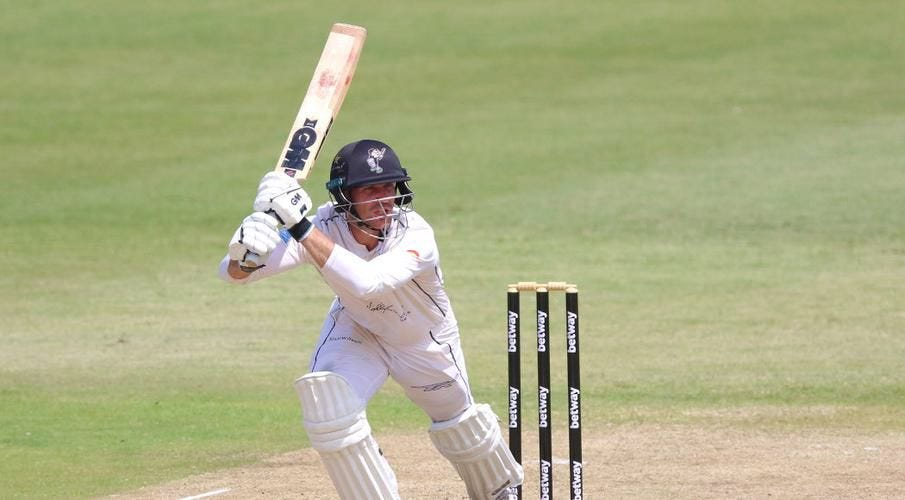The Evolution of SJ
From impatient and impulsive to patient and intentional: Sarel Erwee's journey as a cricketer
It’s a long and winding road for Sarel Erwee. One that he was a little impatient with at first, but now is one that he savors every moment of.
If you watch Sarel Erwee close enough, you might be able to pick out who his batting heroes were. For example, his trigger movements have a hint of Graeme Smith.
His technique or style is a collection of the things that he has adopted from his batting heroes. It's like Adi Birrel's toolbox.
"I talk about having my coach's toolbox," says Birrel. "And my toolbox has many tools, and only a few of those tools are my very own tools that I made. There's so many stolen tools there from this coach, and he says something and I'm like 'Wow, I like that. I will put that into my toolbox.' And then someone outside of cricket might do something, or I observe something, I will take it and put it into my toolbox too,"
(Birrel is head coach of Hampshire County Cricket Club.)
Birrel's coaching philosophy is an amalgamation of what he picks up as he goes, and Sarel's batting style is like that, it's Sarel's toolbox. He took the best bits from his heroes and made them his. But you would need to have a really good eye to see the influences, unlike seven years ago when opposition players picked out that he had quite a bit of Graeme Smith in him.
He was playing club cricket for Weybridge CC back then.
You would think that a player who started his career as a right handed bowler would have modeled his style after legendary right handers. But, Sarel, oddly enough, for a reason that even he cannot adequately explain, was always drawn to left-handers: Jacques Rudolph, Graeme Smith, Ashwell Prince, Matthew Hayden, Justin Langer, Mike Hussey.
"When I was a bit younger I tried to impose myself a bit like Matthew Hayden. You know, walk down the wicket burly, puffing your chest out and try to give the bowlers a whack," he laughs. "During my years of progressing, learning my trade, I tried to pick something from each batter and implement that into my batting."
It's less obvious now, he has cleaned up his style. And that's what he does a lot of times, he cleans up a lot. When he is batting he has a tendency to clean up his crease. It's one of those things he does after almost every ball. He does to declutter his mind. It's his way to help him not think about the previous ball, the bowler or if an opposition player is chirping him. The cleaning of the crease helps him to refocus, it's part of his process.
It's not just the crease he cleans up, he extends that to the dressing room.
"I ask myself, who is the worse individual the one who drops a can on the floor or the one who sees it and does not pick it up," Sarel told me.
But, he doesn't do these things because he a neat freak or something of that nature. Talking to him, one gets the sense that the cleaning is a metaphor for something bigger. It's more than being a person who goes around picking trash in the dressing room. But, it is about taking responsibility. Taking responsibility of his surroundings, of those around him and taking responsibility of the team.
But, he wasn't always like this, he didn't always take responsibility. Taking responsibility is something that has come with time, with being around people who have had an impact on his thinking. People like Grant Morgan and Shane Burger.
"Morgs is one of those people who will not do the easy thing, he will do the right thing even when it is hard. So a lot of the time I ask myself, 'what would Morgs do?'"
What would Morgs do? The question that Sarel asks himself is a testament to the depth of Grant Morgan's influence on him and their relationship.
"SJ is a great team man. He has massive respect for his teammates and will often go out of his way for a teammate," says Robbie Frylinck.
Every athlete has that one coach whom they feel provided a turning point in their career, the one who believed in him and made them a better person and athlete. For Sarel that is Grant Morgan. He cannot speak of his development as a player without mentioning Morgs. He is still in touch with him to this day, though it is not as often as he would like because they are both busy with their respective commitments.
And what does Morgs say?
"When I worked with Sarel I saw a young player with a strong commitment to his growth and to the team. He was really driven to get the team into winning positions," says Grant Morgan.
Maybe Morgs saw a winner very early on, not just because of his talent, but because of his commitment to learning and growing as a cricketer. His desire to learn could very well be one of the reasons why Morgs could have paid a little more attention to his development. He saw the dedication, the hunger and the potential, and invested in developing it.
In the 1980s Dov Eden, an organizational psychologist, demonstrated that a lot of success hinges on the relationship between mentor and mentee, how close they are, or how favorably the mentor looks upon the student.
Eden showed this in study that he did with the Israeli Defence Force. What he did was that he randomly selected groups of trainees and wrote great appraisals to their new commanders. To the new commanders he wrote: "...the average command potential of your trainees is appreciably higher than the usual level. Therefore, you can expect unusual achievements from the trainees in your group."
The result was that the platoon leaders worked with these trainees believing in their potential and acted in ways that made this potential a reality. Platoon leaders who held high expectations for their trainees provided more help, career advice and better feedback. When the trainees made mistakes, instead of assuming that they're lazy or incompetent, the platoon leaders saw this as an opportunity for them to teach and support them.
The supportive behaviors of the platoon leaders gave the trainees confidence and ability, while at the same time enabling and encouraging them to achieve higher performance.
And there is a strong likelihood that this relationship might not have turned out the way it did had their paths crossed a couple of years earlier. Yes, before then Sarel was driven, it's just that his drive was probably a little misguided. He had a bit of impatience about him. He wanted success and recognition, and he wanted them as soon as yesterday.
In fact, there was a time when he left cricket in a huff because he felt overlooked. After school and a stint at the Dolphins academy, Sarel stopped playing cricket for a year because he felt that he had done all that was required for him to be recognized and yet was not getting the opportunities he felt were due to him.
It is only now that he has doubts that he had done everything required.
"I did the right things, or I say I did the right things, but maybe I didn't. But I didn't get opportunities in the amateur sides that I wanted to get. So, I kind of left cricket for a year."
And if it wasn't for David Miller, he might have never found his way back. It just happened that a year into his self-imposed exile from cricket, his friend David Miller found himself in a situation: he had to go to play club cricket in the UK and also had to join the national academy. But because he couldn't be in two places at the same time he asked his friend to fill in for him.
What Sarel took up as a paid holiday turned out to be an experience that brought him back in love with cricket again. After his time in the UK was up he decided to give the local league another go, and he did quite well with KZN Inland.
The experience made him realize that if he did the right things, not just to go to the nets to hit lots of balls, but if he invested in targeted practice and focused on specifics, cricket might just be a career for him. And that is what he did, invested time in a process of meaningful practice. He also changed his mindset, and became more optimistic. Not positive, but optimistic.
"I try to stay optimistic that things will come right and keep doing the right things, the things that you have done in the past. And allowing that to take care of the process. I am process driven, it's not just about the end result," he says. "So everyday is about getting two or 3% better, and the only way you can do that is by being optimistic. Trust the process that's got you where you are now. Keep doing the right things and you will come right."
Besides being an optimistic player, he is more patient now. Patient with himself, patient with the game and patient with his teammates. He doesn't rush things and doesn't expect things to happen quickly. He sort of let's life and the game come to him. He is calmer.
"SJ is a proper team man. Very passionate. Very witty and some good banter." Mangaliso Mosehle.
"I'm not as intense anymore in the change room, I try to observe a bit more and listen and then give advice. I think when I was a bit younger I was a bit all over the show, like a little puppy. As I have grown up a bit more and gone through the process of life, I've kind of relaxed a bit more. Just taking things in my stride."
Of course, it doesn't mean that he competes any less intensely, he gives his all at what he does and walks away with the knowledge that he has put his best foot forward, whatever the results.
But, it's not just the ageing that has made him calmer. In the past 18 or so months as he has also started seeing a sports psychologist. Sarel feels that maybe mental health is something South African athletes do not pay enough attention to. He hope that things change very soon on that front. He is quite passionate about the subject of mental wellbeing.
"I chat to a lot of people, sportspeople, and I feel that they are holding a lot of things inside. And those things are holding them back from showing their full potential," Sarel says. "For me, things have become more satisfying, both on and off the cricket field, because of the process that I am going through with Kirsten Van Heerden."
Van Heerden is the sports psychologist whom he is working with, and he couldn't have found a better match. Kirsten is not just qualified to do her job, but she is also a former professional athlete. She was a top swimmer. She represented South Africa at the Commonwealth Games in 2006.
Of course she could not say a lot about Sarel as he is her patient and doctor/patient confidentiality and all that, but she does describe him as, "a really lovely guy and so down to earth."
With her help, he is now able to compartmentalize his life better. I remember Eric Simons telling me that one of the biggest problems many players have is their inability to separate the cricket player and who they are off the the pitch. The inability to switch off.
"I do not think that you can ever be a finished article when it comes to mental health, stuff. But I must say that having gone through it, or going through it, it's incredible what you learn about yourself and the little things that you can do to make things better. My path is now a touch smoother than it was," says Sarel.
And he adds, "I am less nervous and am more focused on the now, you know when I am going to bat or playing cricket. And when I go home it's life again, it's not cricket."
His personal life doesn't affect his cricket and his cricket doesn't affect his personal life. His performance doesn't affect his relationships in the dressing room. It has helped him get to a place where he is happy with the person he is becoming.
Even when he joined the Proteas dressing room for the first time last year, despite his excitement, he behaved in the best way only a grounded and respectful person will. He was set on understanding others first before seeking to be understood. The ultimate team man, as Robbie Frylinck who watched him grow for years calls him.
"It's nice to be in a position where you can respect everyone and everyone respects you," chimes in Sarel.
And if you look at the bigger picture, you realize that maybe his call up to the Proteas squad came just at the right time. His path to reaching where he is has been long and winding, making him something of a late bloomer. He is just getting into his prime as a player.
His toolbox, though not yet complete - as he still watches a lot of what other players do - now has a good number of tools that can help him as a player and as a teammate. He is now closer to being a complete player than he was a few years ago.
Thank you to everyone who has shown their appreciation of my work and this newsletter. I am entirely freelance and have no intention of putting content behind a paywall. However, for me to be able to continue producing more content, I depend on your patronage. So, please do support my work on Patreon.
Also, please encourage anyone whom you think may be interested in my work to subscribe.








